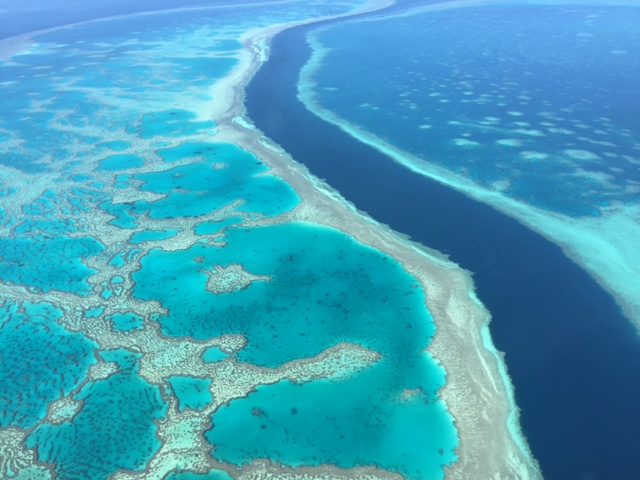In 2016, 2017 and 2020, severe marine heatwaves diminished large areas of coral cover on the Great Barrier Reef. Once thought “too big to fail," the Great Barrier Reef is producing almost 90% fewer coral offspring due to the mass mortality of adult corals in previous years.
The rapid rate of coral loss suggests that natural rates of recovery and adaptation of corals are too slow to keep up with climate change. Even with strong CO2 mitigation, water temperatures will stay elevated for longer periods and will continue to negatively impact corals’ survival. While climate change is the main issue that must be addressed to support the survival of corals, there are steps we can take to help corals survive during these precarious times.
Technological solutions can increase coral cover and corals’ thermal resistance, as outlined in the recently-released Reef Restoration and Adaptation Program Concept Feasibility Study. Among the 43 interventions recommended for further research, genomics is used to understand and develop methods to enhance coral heat and bleaching tolerance; also referred to as assisted evolution.
Here, we present results that indicate the potential for assisted evolution to increase the thermal tolerance of corals and thus help their adaptation to conditions that are currently causing unsustainable stress.
Selective breeding to understand and enhance tolerance
Corals are naturally diverse and their survival from bleaching is in part due to coral genes that underpin bleaching susceptibility and heat tolerance. Corals adapt when those genes are passed among generations and become more abundant on local reefs. However, the flow of tolerant corals’ beneficial genes, such as the gene flow from northern to southern reefs, is unlikely because of the large distances and opposite-moving currents. Therefore, ‘assisted gene flow’ helps those tolerant genes move across seascapes to speed up natural adaptive rates of more susceptible populations.
We have conducted coral transplantation and cross breeding experiments on the Great Barrier Reef for more than 15 years. Our work shows that corals with at least one parent from northern, and naturally warmer reefs are 26-fold more likely to survive at higher temperatures compared to corals with both parents from cooler reefs. In addition, our models suggest that beneficial change in less tolerant populations and reef scales is within reach, if corals are cross-bred and multiplied in large-scale aquaculture facilities. The first phase of the RRAP R&D Program is designed to facilitate the delivery of 10 million juvenile corals on the Reef. This provides the means to spread more resistant corals to cooler but warning reefs where they would improve reef survival.
Another promising technique for enhancing coral’s thermal tolerance is to hybridise coral species with selective breeding of distinct species. Our experiments over the past few years found equal or higher growth, survival and recruitment rates of hybrids compared with the purebred species in today’s and simulated future ocean conditions. Encouragingly, no negative effects of hybridisation were observed. This crossbreeding between coral species and within coral populations not only generates new genetic combinations, but is also a way to rapidly increase genetic diversity, as two divergent genomes are brought together in one organism.

Directed Evolution
The thermal bleaching resistance of corals can be improved by pushing the upper thermal limits of the microalgal symbionts that coral depend on to survive. The algae live inside the coral cells and provide most of the coral’s nutrition through photosynthesis. By culturing the microalgae at elevated temperatures in the laboratory, we have directed their adaptations towards tolerating higher temperatures. While naturally occurring populations would be exposed to elevated seawater temperatures only once a year during summer, directed evolution speeds up naturally occurring adaptations of the algae by maximising growth rates in the laboratory, while at the same time exposing the microalgae to sublethal levels of thermal stress.
After four years, or approximately 120 generations, of directed evolution, we reintroduced the heat-evolved microalgae into coral larvae and found that the coral larvae with the heat-evolved algal symbionts were more thermally tolerant than the coral larvae that associated with non-evolved microalgae. This technique can support the conservation of coral diversity, because the heat-evolved microalgae can potentially form a symbiosis with a variety of different coral species and remain longer in symbiosis during heat stress to supply nutrients to the coral.
What's next?
Genetic interventions such as those described above increase climate resilience and genetic diversity. This is particularly important given the current rapid rate of coral loss, which will almost certainly reduce existing genetic diversity. The more we can support corals’ genetic diversity, the better they can adapt to a changing environment.
While such interventions come with potential risks that must be rigorously tested under laboratory and controlled field conditions, they also need to be evaluated in the risk context of doing nothing. Further proposed research under the RRAP Research and Development Program will provide key data to assess the long-term feasibility of applying assisted evolution on the Great Barrier Reef and to better understand the benefits and risks of these management interventions.
The hope is that these methods will potentially fast-track heat tolerance to vulnerable corals across the Great Barrier Reef. If successful, assisted evolution may provide novel restoration interventions to decrease coral bleaching and mortalities worldwide – but it is not a panacea to the over-arching problem of climate change. These interventions must go hand-in-hand with conventional management and strong, decisive action on climate change mitigation.
